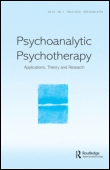
Psychoanalytic Psychotherapy
Scope & Guideline
Fostering Innovations in Psychoanalytic Thought
Introduction
Aims and Scopes
- Psychoanalytic Theory and Practice:
The journal emphasizes the theoretical underpinnings of psychoanalysis, exploring classical and contemporary perspectives that inform clinical practice. - Clinical Applications of Psychoanalysis:
A core focus is on the practical application of psychoanalytic concepts in therapeutic settings, including case studies, treatment outcomes, and therapeutic techniques. - Interdisciplinary Approaches:
The journal encourages contributions that integrate psychoanalysis with other disciplines such as neuroscience, sociology, and cultural studies, fostering a broader understanding of mental health. - Diversity of Psychoanalytic Perspectives:
It showcases a range of psychoanalytic schools of thought, including but not limited to Freudian, Lacanian, and relational psychoanalysis, allowing for a rich dialogue among practitioners. - Impact of Societal Issues on Mental Health:
The journal addresses how sociocultural factors, such as trauma, identity, and systemic issues, influence mental health and therapeutic processes.
Trending and Emerging
- Trauma and Its Multidimensional Impact:
There has been a significant increase in research addressing trauma, particularly its effects on families, communities, and societal structures, reflecting a growing recognition of trauma's pervasive influence on mental health. - Integration of Technology in Therapy:
The exploration of telepsychology and remote therapy practices has surged, especially post-COVID-19, indicating a shift towards understanding how technology can enhance or alter therapeutic relationships. - Mentalization and Its Applications:
Papers focusing on mentalization-based approaches are trending, showcasing a growing interest in how mentalizing processes can facilitate therapeutic outcomes, particularly in complex cases. - Cultural and Societal Influences on Psychoanalysis:
Research increasingly examines the intersection of psychoanalysis with cultural issues, such as race, gender, and socioeconomic status, indicating a broader contextualization of therapeutic practices. - Contemporary Ethical Issues in Psychoanalysis:
The journal is seeing a rise in discussions about ethical considerations in practice, including issues related to consent, power dynamics, and the impact of societal changes on therapeutic ethics.
Declining or Waning
- Traditional Psychoanalytic Techniques:
There seems to be a decline in papers focusing exclusively on traditional psychoanalytic techniques without integration of newer methodologies or interdisciplinary perspectives. - Theoretical Disputes within Psychoanalysis:
Discussions centered around theoretical disputes among different schools of psychoanalysis are less frequent, suggesting a shift towards more unified or applied approaches. - Psychoanalysis in Isolated Contexts:
Research focusing on psychoanalysis in highly specific or isolated cultural contexts appears to be waning, indicating a preference for broader, more generalizable studies. - Historical Perspectives on Psychoanalysis:
There is a noticeable decrease in papers that focus solely on the historical evolution of psychoanalysis, with more emphasis now placed on contemporary applications and innovations. - Narrowly Defined Clinical Populations:
Research targeting narrowly defined clinical populations (e.g., specific disorders) is becoming less common, as the journal increasingly favors studies with broader applicability.
Similar Journals

International Journal of Integrative Psychotherapy
Advancing the Future of Psychotherapy.International Journal of Integrative Psychotherapy is a leading platform dedicated to advancing the field of psychotherapy through rigorous research and innovative practices. Published by the International Integrative Psychotherapy Association in Ljubljana, Slovenia, this journal has been an Open Access publication since 2010, ensuring that cutting-edge research is accessible to a global audience. The journal addresses a wide array of topics within integrative psychotherapy, fostering interdisciplinary dialogue and collaboration among researchers, practitioners, and students. With a commitment to promoting well-rounded and evidence-based psychotherapeutic approaches, the International Journal of Integrative Psychotherapy plays a pivotal role in shaping the future of mental health care. Whether you are a seasoned researcher or a budding professional, this journal offers valuable insights that enhance understanding and application in the realm of psychotherapy.
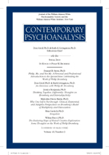
CONTEMPORARY PSYCHOANALYSIS
Exploring the Depths of the Mind.CONTEMPORARY PSYCHOANALYSIS is a prestigious peer-reviewed journal dedicated to advancing the fields of psychoanalysis, clinical psychology, and psychiatry. Published by Routledge Journals, Taylor & Francis Ltd, this journal has been a cornerstone of scholarship since its inception in 1964, facilitating a rich dialogue among researchers, practitioners, and academicians alike. With its current standing in the Q3 quartile for both Clinical Psychology and Psychiatry and Mental Health, it serves as a crucial platform for innovative research and theoretical exploration. Although it does not offer Open Access options, CONTEMPORARY PSYCHOANALYSIS remains essential for those seeking cutting-edge insights and rigorous analyses in psychoanalytic frameworks and their applications. The journal's commitment to high academic standards ensures that it continues to be relevant and impactful in the evolving landscape of mental health and psychoanalytic thought.

Psychotherapie
Fostering Collaboration Between Theory and PracticePsychotherapie is a pivotal academic journal dedicated to the exploration and advancement of clinical psychology, published by the esteemed Springer. Since its inception in 2022, this journal has established a significant footprint in the field, currently positioned in the Q3 category for Clinical Psychology in 2023, as well as being recognized for its Scopus ranking within the top half of its category. This valuable resource features a broad scope of peer-reviewed articles aimed at both theoretical and practical developments in psychotherapy, making it a vital platform for researchers, professionals, and students alike. While the journal is not open access, it maintains a commitment to disseminating high-quality research that can influence best practices and contribute to the ongoing discourse in psychology. The journal's editorial objective is to connect scientific research with clinical practice, ensuring insights garnered from emerging studies are readily available to enhance therapeutic outcomes. Located in the USA with a strong presence in Germany, Psychotherapie promises to be an essential resource for anyone keen on innovative therapeutical approaches and psychological research.

Rivista di Psichiatria
Shaping the Future of Mental Health PracticesRivista di Psichiatria, published by PENSIERO SCIENTIFICO EDITORE, stands as a significant contributor to the field of Psychiatry and Mental Health since its inception in 1975. With an ISSN of 0035-6484 and an E-ISSN of 2038-2502, this esteemed journal offers a platform for rigorous academic discourse and cutting-edge research, helping to shape contemporary psychiatric practices and theories. Currently holding a Q2 designation in Psychiatry and Mental Health based on the 2023 category quartiles, and ranking #197 out of 567 in Scopus, it reflects a commendable 65th percentile among its peers. The journal welcomes contributions that encompass a broad range of topics related to mental health, encouraging contributions from a multidisciplinary approach, which aids in its goal of advancing the understanding and application of psychiatric science. While it is a traditional journal without Open Access options, access to its valuable content can support researchers, clinicians, and students in their pursuit of knowledge and innovation within the field. Situated in Rome, Italy, at VIA SAN GIOVANNI VALDARNO 8, ROME 00138, the journal continues to enhance its rich legacy, promoting the exchange of ideas and fostering collaboration amongst practitioners and scholars alike.
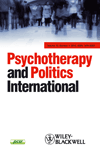
Psychotherapy and Politics International
Unraveling the Influence of Politics on Psychotherapeutic PracticesPsychotherapy and Politics International is a distinguished journal that explores the intricate interplay between therapeutic practices and political discourse. Based in Germany and published by its own dedicated organization, this journal provides a unique platform for interdisciplinary dialogue, catering to researchers, practitioners, and students interested in the multifaceted dimensions of psychotherapy within political contexts. Although it is not open access, its focus on innovative and critical analyses situates it favorably within the field, holding a Q3 category ranking in the Multidisciplinary field as of 2023. The journal, which has published works from 2013 to 2021, reflects a commitment to advancing the understanding of how psychological theories and practices inform and are influenced by socio-political factors. With an increasing relevance in today's global landscape, Psychotherapy and Politics International serves as a vital resource for those seeking to navigate the convergence of mental health and political dynamics.

International Forum of Psychoanalysis
Pioneering Insights for Clinical ExcellenceInternational Forum of Psychoanalysis, published by Routledge Journals, Taylor & Francis Ltd in the United Kingdom, is a pivotal platform for scholarly discourse in the field of psychoanalysis. Since its inception in 1992, this journal has offered a unique intersection of theoretical and empirical perspectives, catering to researchers, clinicians, and students interested in advancing the understanding of psychoanalytic principles and their clinical applications. With an impact factor reflective of its specialized niche and ranked Q3 in Clinical Psychology and Q4 in Psychiatry and Mental Health, the journal plays a critical role in disseminating cutting-edge research that informs best practices in mental health. Although it does not currently offer open access, the International Forum of Psychoanalysis continues to be an essential resource for those seeking to deepen their knowledge of the psychoanalytic field, bridging contemporary theory with clinical practice as it converges through 2024 and beyond.

Archives of Psychiatry and Psychotherapy
Exploring the Frontiers of Mental Health ResearchArchives of Psychiatry and Psychotherapy is a distinguished journal published by the Polish Society of Psychiatry, focusing on the dynamic fields of clinical psychology and psychiatry. Established in 2001 and continuing through 2024, this journal serves as a platform for the dissemination of significant research findings, theoretical advancements, and practical applications in the realm of mental health. With its ISSN 1509-2046 and E-ISSN 2083-828X, it stands out for its commitment to enhancing the understanding of psychiatric disorders and treatments. While it currently reflects a Q3 ranking in Clinical Psychology and a Q4 ranking in Psychiatry and Mental Health, its growing impact and visibility in academic circles are evident from its Scopus rankings, placing it within the 28th and 24th percentiles of its respective categories. The journal emphasizes open access, promoting equitable access to valuable knowledge for researchers, practitioners, and students alike, thus fostering collaboration and innovation in the field. As the mental health landscape evolves, the Archives of Psychiatry and Psychotherapy remains an essential resource for those dedicated to advancing psychiatric practice and research.
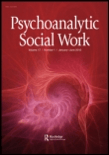
Psychoanalytic Social Work
Bridging Psychoanalytic Insights with Social Work SolutionsPsychoanalytic Social Work is a pivotal journal in the field of social work and psychoanalytics, published by Routledge Journals, Taylor & Francis Ltd. With an ISSN of 1522-8878, this journal has been at the forefront of disseminating innovative research and insightful analyses since its inception in 1999. Although it currently holds a Q4 ranking in the categories of Social Psychology, Social Sciences (miscellaneous), and Social Work, it is dedicated to fostering rigorous dialogue and critical understanding of psychological theories as they intersect with social work practice. The journal invites contributions that offer diverse perspectives, reflecting the multifaceted nature of human behavior and societal challenges. Researchers, practitioners, and students engaged in social sciences will find Psychoanalytic Social Work to be an invaluable resource, especially as it remains committed to advancing knowledge within this interdisciplinary field.
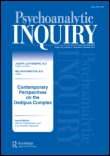
PSYCHOANALYTIC INQUIRY
Transforming Understanding Through Psychoanalytic ResearchPSYCHOANALYTIC INQUIRY is a distinguished journal published by Routledge Journals, Taylor & Francis Ltd, dedicated to advancing the field of psychoanalysis in the context of clinical psychology. Since its inception in 1981, the journal has served as a vital platform for scholars, practitioners, and students to exchange innovative ideas and research findings. With its Q4 category ranking in the 2023 Clinical Psychology quartile, the journal reflects a diverse array of psychoanalytic perspectives and their practical applications in contemporary psychology. Although it operates under a traditional access model, its content is invaluable for those seeking to deepen their understanding of clinical psychoanalysis and its implications for therapeutic practices. Aiming to foster intellectual discourse and enhance clinical practices, the journal navigates through the complexities of the human psyche, making it an essential resource for anyone committed to the nuanced study of psychoanalysis.
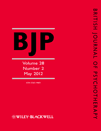
British Journal of Psychotherapy
Exploring New Horizons in Mental Health.The British Journal of Psychotherapy is a prestigious journal published by Wiley, focusing on the intricate fields of Clinical Psychology and Psychiatry and Mental Health. Established in 1984, the journal has provided invaluable contributions to the understanding and progression of psychotherapeutic practices, making it a significant resource for researchers, practitioners, and students alike. With an ISSN of 0265-9883 and an E-ISSN of 1752-0118, the journal features a robust selection of articles, reviews, and empirical studies that underscore the latest developments in psychotherapy. Despite its current categorization in the Q3 quartile in both Clinical Psychology and Psychiatry and Mental Health as of 2023, the journal continually strives to enhance its impact and reach within the academic community, reflecting a commitment to advancing knowledge and fostering dialogue in mental health care. For those seeking a comprehensive understanding of contemporary psychotherapeutic methods and research, this journal remains an essential read.